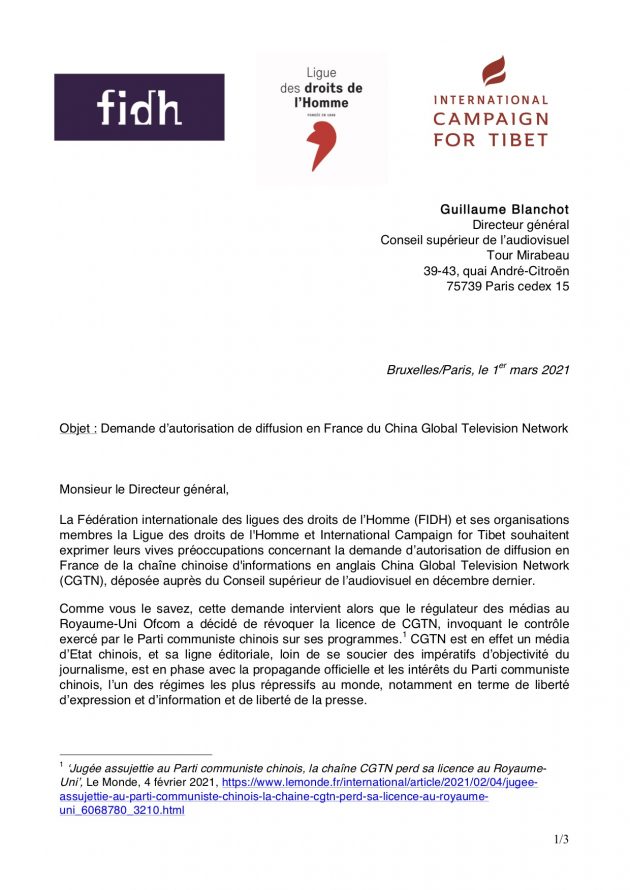On 1 March 2021, the International Campaign for Tibet, together with FIDH and its French member organisation Ligue des droits de l’Homme, addressed an open letter calling on the Conseil supérieur de l’audiovisuel – CSA, the French media regulator – to reject the broadcasting authorization request introduced by Chinese state-media China Global Television Network (CGTN).
According to a report by the Financial Times, CGTN indeed approached the CSA last December, just days before it was stripped of its right to air by UK media watchdog Ofcom, who said it was “ultimatly controlled” by the Chinese Communist Party. The CSA, said it must now first decide whether it is competent, and then whether or not to allow CGTN to broadcast in France.
Although no French law prohibit state-controlled broadcasters from airing in the country, ICT and the other signatories of the letter believe that the CSA should follow Ofcom’s decision and forbid CGTN from broadcasting the Chinese authoritarian regime’s propaganda on French soil.
This decision will be all the more important that the CSA’s decision will impact the capacity of CGTN to air all over Europe (including in the UK): according to an agreement of the Council of Europe, once a broadcaster obtained a licence to beam in a signatory member state, this licence is indeed also valid in the other signatories states.

Below is an unofficial English translation by ICT.
Guillaume Blanchot
Directeur général
Conseil supérieur de l’audiovisuel
Tour Mirabeau
39-43, quai André-Citroën
75739 Paris cedex 15
Subject: Request for authorization to broadcast in France from the China Global Television Network
Brussels/Paris, March 1, 2021
Mr. Director General,
The International Federation for Human Rights (FIDH) and its member organisations the Ligue des Droits de l’Homme and the International Campaign for Tibet wish to express their serious concerns regarding the request of Chinese information channel China Global Television Network (CGTN) for authorization to broadcast in France, that was made to the Conseil Supérieur de l’audiovisuel last December.
As you know, this request comes as UK media regulator Ofcom has decided to revoke CGTN’s license, citing the control exercised by the Chinese Communist Party over its programs.[1] CGTN is indeed a Chinese state-media, and its editorial line, far from taking into account the imperatives of objectivity of journalism, is in line with the official propaganda and the interests of the Chinese Communist Party, one of the most repressive regimes in the world, especially in terms of freedom of expression and information and freedom of the press.
Since President Xi Jinping came to power in particular, the human rights situation in China has deteriorated sharply, as evidenced by the establishment of a legislative arsenal to control NGOs, the monitoring of Internet networks, the police control of Tibetans and Uyghurs, the practice of arbitrary detention or enforced disappearances, the endemic use of torture in detention[2]… In terms of press freedom, the country continues to stagnate at the very end of the annual ranking of RSF; many journalists are still detained for covering the health crisis. Chinese authorities are also severely restricting foreign journalists’ access to Tibet and Xinjiang, and expelling from their territory or barring from broadcasting those who criticize their oppressive policies.[3]
At the same time, the Chinese government has increased in recent years its efforts to instrumentalize our free media in order to export its propaganda abroad and influence public opinion outside its borders, as revealed by RSF[4] and various studies by research institutes.[5] Previously, Ofcom had pinned CGTN for its bias in its coverage of pro-democracy protests in Hong Kong in 2019.
In this context, and although no law in France prohibits state-controlled media from broadcasting in the country, we believe that in the event that the Conseil supérieur de l’audiovisuel is competent, it would be its moral duty – as guardian of the quality of information and of the imperative to fight against disinformation, pillars of our democracies that are the free media – to prevent a channel of an authoritarian regime from airing its false propaganda on French soil. We therefore ask it to follow Ofcom’s decision and to reject CGTN’s request.
The preservation of the freedom and independence of the media is at stake not only in France, but also throughout Europe, since according to a European sharing agreement, a broadcasting license obtained in one of the member countries is valid in all others. As a result of Ofcom’s decision, several distributors that broadcast CGTN in Germany have temporarily stopped broadcasting the channel, and are now awaiting the decision of the French authorities on the matter.
We thank you in advance for your consideration,
Best regards,
Gaelle Dusepulchre
Permanent Representative to the European Union
FIDH
Vincent Metten
EU Policy Director
International Campaign for Tibet (ICT)
Malik Salemkour
President
Ligue des Droits de l’Homme (LDH)
[1] ‘Jugée assujettie au Parti communiste chinois, la chaîne CGTN perd sa licence au Royaume- Uni’, Le Monde, February 4, 2021, https://www.lemonde.fr/international/article/2021/02/04/jugee- assujettie-au-parti-communiste-chinois-la-chaine-cgtn-perd-sa-licence-au-royaume- uni_6068780_3210.html
[2] Over the last few months, many Tibetans have died in custody – or shortly after their release – as a result of the torture and mistreatment they sustained in detention. See for example https://www.savetibet.eu/tibetan-monk-dies-after-beating-in-custody-pattern-of-torture-and- mistreatment-in-tibet-must-end/; https://www.savetibet.eu/ict-calls-for-investigation-after-tibetan- dies-following-torture/
[3] In 2015, Beijing correspondent for l’Obs Ursula Gauthier was expelled from China after an article mentionning the repression of the Uyghur minority in Xinjiang (https://www.reuters.com/article/ofrtp-france-chine-journaliste -idFRKBN0U905V20151226). More recently, the BBC has been accused by Chinese authorities of “biased and inaccurate” reporting by after it published testimonies of women in Xinjiang who described being raped in detention camps, and has been banned from broadcasting on Chinese soil.
[4] ‘China’s Pursuit of a New World Media Order’, Reporters Without Borders (RSF), March 22, 2019, https://rsf.org/en/reports/rsf-report-chinas-pursuit-new-world-media-order. “If democracies do not resist, Beijing will impose his view and his propaganda, which is a threat for journalism and democracy,” said General Secretary of RSF Christophe Deloire.
[5] See for example Authoritarian advance: Responding to China’s growing political influence in Europe, MERICS and GPPi, February 2018, https://www.merics.org/en/publications/authoritarian- advance